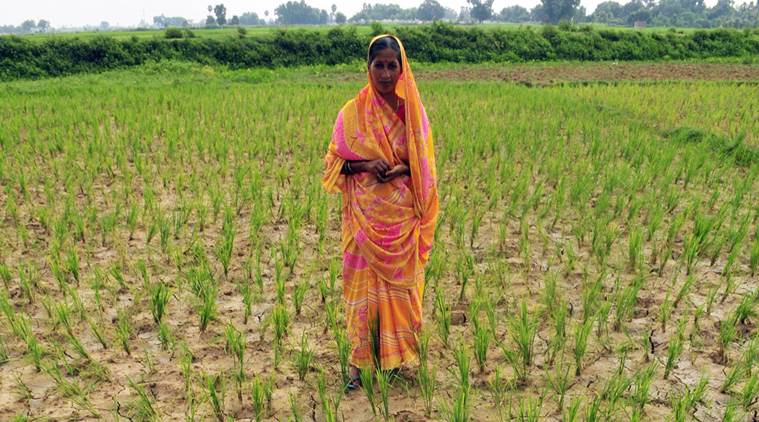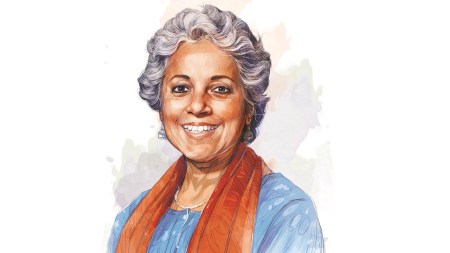- India
- International
A field of her own
Advancing rights of women farmers can revolutionise the rural ecosystem
 The chance of propertied women being physically abused is reduced from 49 per cent to 7 per cent due to an increase in the wife’s bargaining power. (Source: Express Photo By Prashant Ravi)
The chance of propertied women being physically abused is reduced from 49 per cent to 7 per cent due to an increase in the wife’s bargaining power. (Source: Express Photo By Prashant Ravi)
The stereotypical image of an Indian farmer is a mustachioed man, clad in a white dhoti with farming tools in hand. The reality is the Indian agricultural landscape is fast being feminised. Already, women constitute close to 65 per cent of all agricultural workers. An even greater share, 74 per cent of the rural workforce, is female. Despite their hard labour in the field, women are not officially counted as farmers, and are either labelled “agricultural labourers” or “cultivators”. This is because the government does not recognise as farmers those who do not have a claim to land under their name in official records.
As many as 87 per cent of women do not own their land; only 12.7 per cent of them do. There are two primary reasons for the alarmingly low number: One, land being a state subject is not governed by the constitution under a uniform law that applies equally to all citizens but rather is governed by personal religious laws, which tend to discriminate against women when it comes to land inheritance. Second, the cultural aspect of the deep-rooted biases that hinder women’s ownership of land in patriarchal societies cannot be discounted.
Providing women with access to secure land is key to incentivising the majority of India’s women farmers. This, coupled with the need to make investments to improve harvests, will result in increased productivity and improve household food security and nutrition. As has been determined from numerous studies conducted worldwide, women have a greater propensity to use their income for the needs of their households. Land-owning women’s offspring thus receive better nourishment and have better health indicators. Land-owning mothers also tend to invest in their children’s education. Ultimately, this is a win-win situation all around — for the farmer, her family and the larger ecosystem.
However, even if we could, all of a sudden, grant women the right to the land they cultivate, it would not necessarily immediately result in these beneficial outcomes. Practically speaking, Indian farmers, both men and women, face an uphill battle even leasing land. After abolishing the zamindari system, states moved to restrict tenancy as a protective measure guarding against tenant exploitation. However, since the 1950s, the tenancy situation has varied across the nation as land laws are enacted by the states. And yet, nearly 35 per cent of India’s agricultural land is cultivated by tenant farmers, who tend to be landless, poor and marginal.
Before aiming at the lofty goal of securing women’s land ownership rights, working toward ascertaining security of tenure for tenant farmers is a necessary first step. With security of tenure, female farmers should be provided with the three critical driving factors — the incentive, the security, as well as the opportunity — to invest in the land they harvest. Security of land tenure also presents advantages for landlords by removing the fear of losing their land ownership.

In fact, in March 2016, the NITI Aayog released the Model Agricultural Land Leasing Act, which seeks to legalise and liberalise land leasing with the interests of both the landlord and the tenant in mind. The Model Act could enable the real cultivators of land to be recognised as farmers and thus be entitled to obtain important inputs provided to farmers by the state. This has the potential to improve the productivity of farmer harvests, replacing unwilling cultivators with willing cultivators. Madhya Pradesh and Uttar Pradesh have expressed interest in the Model Act, while some others like Odisha, Andhra Pradesh and Telangana are at an advanced stage of enacting their own land leasing laws based on the Model Act.
The macro-level results of securing women farmers’ land tenure are clear, but consider for a moment the impact it would have at the micro-level — the wiping away of the debilitating feelings of insecurity and vulnerability for rural women. The chance of propertied women being physically abused is reduced from 49 per cent to 7 per cent due to an increase in the wife’s bargaining power. If female farmers are provided security of land tenure, they will be officially recognised as farmers and hence, will see their household bargaining power increase. Women farmers’ self-confidence and agency will slowly grow and expand outside just their household.
We know India has the intention to ensure food security for its citizens and boost women’s rights; these constitute goals two and five of the Sustainable Development Goals that our country committed to in 2015. Giving agency to women farmers is critical in realising these outcomes. Ultimately, women farmers are unstoppable if they can be helped to realise that they deserve better. And it all begins with creating a new image for the “Indian farmer”.
EXPRESS OPINION
More Explained
May 23: Latest News
- 01
- 02
- 03
- 04
- 05








































